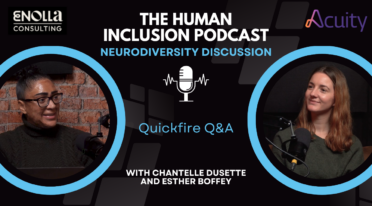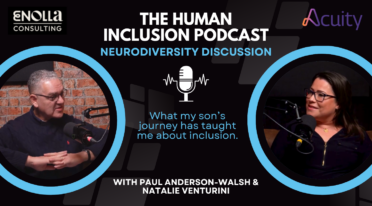The importance of ‘Cultural Congruence’ for talent attraction and retention

I’ve probably interviewed thousands of people over the course of my career, and many of those individuals and interviews still stand out to me today. Yet now more than ever the people I meet are making more of an impression on me than before because they really value culture.
Culture is the backbone of any successful business. It is the set of shared values, beliefs, and practices that shape the way a company operates and interacts with its employees, customers, and community. A positive and strong company culture can have a direct impact on the performance and engagement of employees, which in turn can greatly impact the bottom line.
However, having seen the impact that company culture has on a person’s life I like to believe that Thomas Carlyle said it best ” Culture is the process by which a person becomes all that they were created to be” and it is true, that company culture can make or break someone’s job experience for them. This is why I am a huge advocate of getting ‘cultural congruence’ right from the get-go for your employees.
So, what are the benefits of having a strong cultural congruence and what can employers do to harness this and attract and retain the best talent as a result?
Benefits of having a strong cultural congruence
Well, when employees feel that they are a part of a strong and positive culture, they are more likely to be engaged in their work and committed to the company’s mission and goals. This increased engagement leads to higher productivity, better customer service, and a more positive work environment. From a study by Haillo “Companies with high employee engagement are 22% more profitable, yet only 33% of employees feel engaged at work!
Cultural congruence, which refers to the alignment of an individual’s values and beliefs with those of the company, also plays a key role in employee engagement and performance. When employees feel that their values align with the company’s culture, they are more likely to feel a sense of belonging and purpose in their work.
On the other hand, when employees feel that the culture of the organisation does not align with their values, they are more likely to experience dissatisfaction and disengagement in their work. This can lead to increased turnover rates, lower productivity, and hurt the overall work environment.
So, what’s the secret?
People-Centric Values First
It’s all very well getting your mission, goals and free breakfast perks printed on shiny gold paper and distributed across the office, but the people and clients I support first and foremost care about people. They want to find, meet, or be connected to, individuals and groups who share similar values and perspectives.
Perhaps the shift in our employee experience throughout the pandemic drove many of us to think about this more. When I sit down with a client to take a briefing on a new assignment it is top of mind to understand their values, describe their people to me and help me build a picture of what drives their successes and what it feels like to work for that organisation / leader. Often this is what potential talent wants to hear about the most, rather than what types of snacks you offer in the office.
Why is this important?
Any hiring process will need to ensure that there are values congruence for both the employer and the candidate – as well as trust – when trust is explicit rather than implied there are greater levels of engagement.
Paul Zak from Harvard business review said:
“Employees in high-trust organizations are more productive, have more energy at work, collaborate better with their colleagues, and stay with their employers longer than people working at low-trust companies. They also suffer less chronic stress and are happier with their lives, and these factors fuel stronger performance.”
A really good example of how certain companies have been tracking the impact of culture on their workforce is at SAP, a multinational software enterprise who have been “connecting employee wellbeing with their bottom line for more than a decade. They’ve created a Business Health Culture Index (BHCI) to track the ROI of well-being investments. BHCI has increased by 11% from 2013 to 2020, each 1% increase delivering a €90m-€100m operating profit impact.”
Respect, trust, and openness seem to be critical measures of success where a positive culture is concerned, high degrees of all three are common in all forms of highly functional relationships (professional and personal), so it should not be a surprise that individuals (employees) are now expecting this from their employers.
Who owns Culture?
In short, all of us become responsible for creating and sustaining culture as soon as we join an organisation that espouses a specific set of values. I have recently interviewed several CPOs for a client and the topic of EVP and culture came up a lot.
And it was no surprise to me that everyone I spoke to through this process was adamant that culture is an organisation-wide responsibility – and that we are all in essence ‘culture-builders’ and that no single person or function has accountability for it.
In the ongoing ‘war’ for talent across sectors it is vital that culture is a fundamental strategic priority for organisations, but that the building blocks of a great culture can be owned by all parts of the business. The Board may guide its definition to an SLT that builds upon that and translates it into leadership behaviour; HR may define and create the right employee experiences for line managers to deliver to employees and employees create feedback loops for the SLT to provide insight on what is aligning and what is not. It becomes organic by whole business involvement and continuous feedback loops.
Employee and Employer Synergy
In a post-pandemic world, it looks as though the lines between our personal and professional lives are blurring more, the need for greater flexibility and the absence of guaranteed in-person time brought about through hybrid working styles has highlighted a greater ineffectiveness of top-down leadership styles, placing an even bigger emphasis on the ‘culture-builder’ style of organisation.
If we are all destined to influence the culture of the business we work for, it seems logical that our values and purpose will start to merge / blend with that of the company. What drives us outside of work starts to influence the places we choose to work – That’s why at Acuity we are delighted to partner with organisations that are driven to do good – whether that is related to sustainable investment or influencing the future of travel to make it greener. Every day we have the privilege of helping our customers find value congruence together to generate great relationships and ultimately impactful results.
In conclusion, culture congruence matters within a business because it plays a crucial role in employee engagement and performance. A strong and positive culture that is aligned with the values and beliefs of employees can lead to increased productivity, better customer service, and a positive impact on the bottom line.
As such it is important for both companies and employees to actively cultivate and maintain a positive culture that aligns with its values and goals.
How can Acuity help leaders find their next highly synergistic opportunity?
Firstly, we will spend as much time as needed to understand what drives and motivates you, our face-to-face interviews (conducted online or in person) are designed not only to look at what you have achieved and the how behind those achievements, but we are driven to understand your ‘Why’.
It might be as simple as exploring the question “what keeps you awake at night?” and digging into the values that underpin those concerns. Sometimes it also help to explore those career hiccups if there are any.
In my experience, the roles that a person may have taken where they did not thrive quite as they had hoped – are key messages around a set of values and motivators and the absence of congruence with that particular organisation or manager / leader. As well as these ‘light bulb’ moments there is often a lot to be revealed from exploring career highlights.
I like to ask people what they would like their professional legacy to be. What would you like to be remembered for? A lot is revealed by exploring what drives success in individuals. It goes without saying that we are interested in understanding the whole person to create an alignment for them from that perspective.
How can Acuity support employers with the articulation of their Values and Purpose to attract high-match leaders?
Integral to the relationships we develop with our clients is the importance of understanding the drivers, values and motivators of individual leaders within an organisation, and taking the time to understand how that coalesces to form a living and breathing culture.
Given many of our clients are founder-led organisations the impact of personal values can be strong. It is therefore so important that we can articulate these beliefs and aspirations clearly throughout our search processes, weaving the right language into every communication.
For the time we are working on a client’s behalf, we adopt their terminology, and try as best as we can to mirror values and culture in everything we do. We seek to be able to bring the culture to life and to be able to speak to specific examples of this. At the same time, we are prepared to offer advice on where there may be any incongruence from the point of view of articulated culture and values and understand the value of pointing that out!
If you are interested in discovering how Acuity can help find the right employees for a strong cultural fit, then please don’t hesitate to contact us, info@acuity-partners.io
The latest thinking from around Acuity




